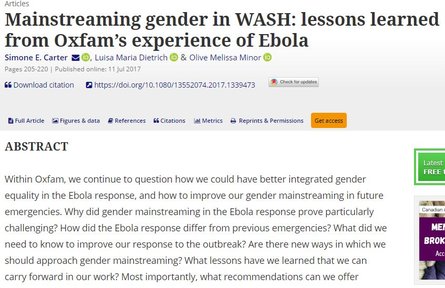
Within Oxfam, we continue to question how we could have better integrated gender equality in the Ebola response, and how to improve our gender mainstreaming in future emergencies. Why did gender mainstreaming in the Ebola response prove particularly challenging? How did the Ebola response differ from previous emergencies? What did we need to know to improve our response to the outbreak? Are there new ways in which we should approach gender mainstreaming? What lessons have we learned that we can carry forward in our work? Most importantly, what recommendations can we offer beyond those already provided in existing guidelines? In this article, we reflect on our experience as non-medical specialist practitioners involved in the response, to help us answer these questions.
